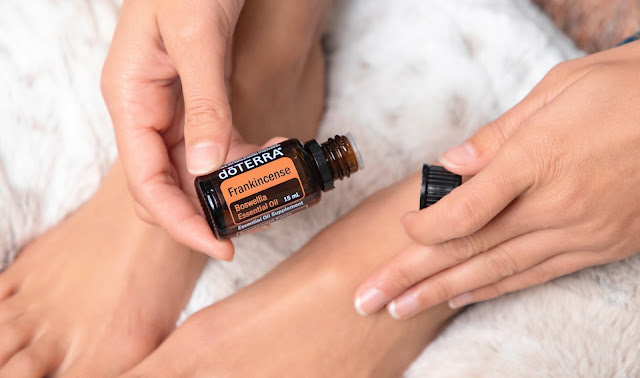10 Best Essential Oils For Skin Care
These are essential oils that can be helpful for the skin, including:
1- Jojoba Oil
The seeds of the jojoba plant are used to make the natural oil known as jojoba oil (Simmondsia chinensis). It is commonly used in skincare due to its moisturizing properties.
- Moisturizing - Jojoba oil is similar in composition to the sebum produced by our skin, making it easily absorbed and providing intense hydration.
- Non-Comedogenic - Unlike other oils, jojoba oil is non-comedogenic, meaning it won't clog pores and cause breakouts.
- Anti-Inflammatory - Jojoba oil has anti-inflammatory properties that can soothe irritated skin and reduce redness.
- Antioxidant - Jojoba oil is rich in antioxidants that can help to protect the skin from damage and improve its overall health.
Jojoba oil is versatile and can be used on all skin types, making it a popular ingredient in skincare products. It can be used as a stand-alone product, or blended with other oils for a personalized skincare routine. However, it is important to note that jojoba oil should be diluted with a carrier oil before being applied to the skin.
2- Olive Oil
Olive oil is a natural oil that is extracted from the fruit of the olive tree (Olea europaea). It is commonly used in skincare due to its nourishing properties.
- Hydrating - Olive oil is rich in vitamins and antioxidants that can hydrate and nourish the skin, reducing the appearance of fine lines and wrinkles.
- Antioxidant - Olive oil contains antioxidants such as vitamin E and polyphenols, which can protect the skin from damage caused by free radicals.
- Anti-inflammatory - Olive oil has anti-inflammatory properties that can soothe irritated skin and reduce redness.
- Skin Barrier - Olive oil can also help to strengthen the skin's barrier, improving its overall health and preventing moisture loss.
Olive oil is suitable for all skin types, but it is particularly beneficial for dry and mature skin. It can be used as a stand-alone product, or blended with other oils for a personalized skincare routine. However, it is important to note that olive oil should be diluted with a carrier oil before being applied to the skin.
3- Coconut Oil
Coconut oil is a natural oil that is extracted from the flesh of coconuts (Cocos nucifera). It is commonly used in skincare due to its moisturizing properties.
- Moisturizing - Coconut oil is a natural emollient that can hydrate and soothe dry, irritated skin.
- Antibacterial - Coconut oil has antibacterial properties that can help to fight against skin infections and breakouts.
- Antioxidant - Coconut oil contains antioxidants that can protect the skin from damage and improve its overall health.
- Skin Barrier - Coconut oil can also help to strengthen the skin's barrier, improving its overall health and preventing moisture loss.
Coconut oil is suitable for all skin types, but it is particularly beneficial for dry and sensitive skin. It can be used as a stand-alone product, or blended with other oils for a personalized skincare routine. However, it is important to note that coconut oil should be diluted with a carrier oil before being applied to the skin. Also read "Treat Hair With Coconut Oil".
4- Chamomile Oil
Chamomile oil is a natural oil that is extracted from the flowers of the chamomile plant (Matricaria chamomilla). It is commonly used in skincare due to its soothing and calming properties.
- Anti-Inflammatory - Chamomile oil has anti-inflammatory properties that can soothe irritated skin and reduce redness.
- Calming - Chamomile oil is well known for its calming properties, making it ideal for use on sensitive and stressed skin.
- Antioxidant - Chamomile oil contains antioxidants that can protect the skin from damage and improve its overall health.
- Moisturizing - Chamomile oil can also hydrate and nourish the skin, reducing the appearance of fine lines and wrinkles.
Chamomile oil is suitable for all skin types, but it is particularly beneficial for sensitive and stressed skin. It should be diluted with a carrier oil before being applied to the skin, as it can be irritating to some people in its pure form.
5- Lavender oil
Lavender oil is a natural oil that is extracted from the flowers of the lavender plant (Lavandula angustifolia). It is commonly used in skincare due to its calming and soothing properties.
- Calming - Lavender oil is well known for its calming properties, making it ideal for use on sensitive and stressed skin.
- Antibacterial - Lavender oil has antibacterial properties that can help to fight against skin infections and breakouts.
- Anti-inflammatory - Lavender oil has anti-inflammatory properties that can soothe irritated skin and reduce redness.
- Moisturizing - Lavender oil can also hydrate and nourish the skin, reducing the appearance of fine lines and wrinkles.
Lavender oil is suitable for all skin types, but it is particularly beneficial for sensitive and stressed skin. It should be diluted with a carrier oil before being applied to the skin, as it can be irritating to some people in its pure form. Additionally, it is important to choose high-quality, pure lavender oil, as some products may contain added chemicals that can be harmful to the skin.
6- Tea Tree Oil
Tea tree oil is a natural oil that is extracted from the leaves of the tea tree (Melaleuca alternifolia). It is commonly used in skincare due to its antibacterial and anti-inflammatory properties.
- Antibacterial - Tea tree oil has strong antibacterial properties that can help to fight against skin infections and breakouts.
- Anti-Inflammatory - Tea tree oil has anti-inflammatory properties that can soothe irritated skin and reduce redness.
- Acne Treatment - Tea tree oil is commonly used as an acne treatment due to its ability to reduce the appearance of pimples and blemishes.
- Soothing - Tea tree oil can also soothe and calm the skin, making it ideal for use on sensitive skin.
Tea tree oil should be diluted with a carrier oil before being applied to the skin, as it can be irritating to some people in its pure form. It is important to choose high-quality, pure tea tree oil, as some products may contain added chemicals that can be harmful to the skin. Additionally, tea tree oil should not be used near the eyes or on mucous membranes.
7- Lemon Oil
Lemon oil is a natural oil that is extracted from the peel of the lemon fruit (Citrus limon). It is commonly used in skincare due to its brightening and rejuvenating properties.
- Brightening - Lemon oil can help to brighten and even out the skin tone, reducing the appearance of dark spots and hyperpigmentation.
- Antioxidant - Lemon oil contains antioxidants that can protect the skin from damage and improve its overall health.
- Rejuvenating - Lemon oil can also help to rejuvenate and refresh the skin, leaving it looking and feeling revitalized.
- Balancing - Lemon oil can also help to balance the skin's natural oils, reducing the appearance of shine and breakouts.
Lemon oil should be diluted with a carrier oil before being applied to the skin, as it can be irritating to some people in its pure form. It is important to choose high-quality, pure lemon oil, as some products may contain added chemicals that can be harmful to the skin. Additionally, lemon oil should not be used on skin that is exposed to direct sunlight, as it can increase the skin's sensitivity to UV rays.
8- Frankincense Oil
Frankincense oil is a natural oil that is extracted from the resin of the Boswellia tree. It is commonly used in skincare due to its anti-inflammatory and rejuvenating properties.
- Anti-Inflammatory - Frankincense oil has anti-inflammatory properties that can soothe irritated skin and reduce redness.
- Rejuvenating - Frankincense oil can help to rejuvenate and refresh the skin, reducing the appearance of fine lines and wrinkles.
- Healing - Frankincense oil can also help to heal and protect the skin, reducing the appearance of scars and blemishes.
- Balancing - Frankincense oil can also help to balance the skin's natural oils, leaving it looking and feeling refreshed.
Frankincense oil should be diluted with a carrier oil before being applied to the skin, as it can be irritating to some people in its pure form. It is important to choose high-quality, pure frankincense oil, as some products may contain added chemicals that can be harmful to the skin. Additionally, frankincense oil should not be used on skin that is exposed to direct sunlight, as it can increase the skin's sensitivity to UV rays.
9- Geranium Oil
Geranium oil is a natural oil that is extracted from the flowers and leaves of the geranium plant (Pelargonium graveolens). It is commonly used in skincare due to its nourishing and balancing properties.
- Nourishing - Geranium oil is rich in antioxidants and fatty acids, making it ideal for nourishing and moisturizing the skin.
- Balancing - Geranium oil can help to balance the skin's natural oils, reducing the appearance of shine and breakouts.
- Anti-Inflammatory - Geranium oil has anti-inflammatory properties that can soothe irritated skin and reduce redness.
- Rejuvenating - Geranium oil can also help to rejuvenate and refresh the skin, reducing the appearance of fine lines and wrinkles.
Geranium oil should be diluted with a carrier oil before being applied to the skin, as it can be irritating to some people in its pure form. It is important to choose high-quality, pure geranium oil, as some products may contain added chemicals that can be harmful to the skin. Additionally, geranium oil should not be used on skin that is exposed to direct sunlight, as it can increase the skin's sensitivity to UV rays.
10- Rose Oil
Rose oil is a natural oil that is extracted from the petals of the rose flower (Rosa damascena). It is commonly used in skincare due to its moisturizing and rejuvenating properties.
- Moisturizing - Rose oil is rich in antioxidants and fatty acids, making it ideal for moisturizing the skin and leaving it feeling soft and supple.
- Rejuvenating - Rose oil can help to rejuvenate and refresh the skin, reducing the appearance of fine lines and wrinkles.
- Anti-inflammatory - Rose oil has anti-inflammatory properties that can soothe irritated skin and reduce redness.
- Brightening - Rose oil can also help to brighten and even out the skin tone, reducing the appearance of dark spots and hyperpigmentation.
Rose oil should be diluted with a carrier oil before being applied to the skin, as it can be irritating to some people in its pure form. It is important to choose high-quality, pure rose oil, as some products may contain added chemicals that can be harmful to the skin. Additionally, rose oil should not be used on skin that is exposed to direct sunlight, as it can increase the skin's sensitivity to UV rays.





Post a Comment